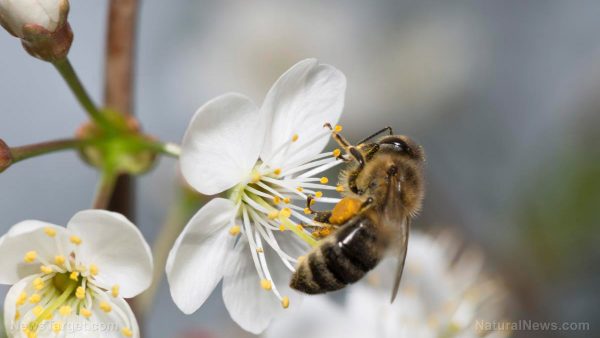Bee-friendly plants sold at garden centers found to be heavily contaminated with deadly pesticides
05/30/2017 / By Earl Garcia

Bee-friendly plants sold at garden centers may not be so friendly after all, as new research found that a vast majority of these plants were laden with toxic insecticides. As part of the study, a team of researchers at the Sussex University in the U.K. examined leaf specimen of 29 plant samples — such as dahlias, allium, bellflowers and foxgloves as well as lavender, salvia and crocuses — taken from various garden centers. The experts noted that more than 15 of these plants bore the Royal Horticultural Society (RHS)’s “Perfect for Pollinators” logo.
The research team found that 70 percent of the plant specimen examined contained traces of neonicotinoid or ‘neonic’ insecticides, three of which were already banned across Europe due to their adverse effects on bee survival. The study also revealed that 23 plants contained more than one pesticide. In addition, some plant specimens were found to contain a mixture of seven to 10 different agrochemicals. According to the research team, neonicotinoid levels present in the plant samples were already deemed harmful for the bee population. In contrast, only two plant samples did not contain the toxic chemicals. These findings were published in Environmental Pollution.
“Garden centres frequently market nectar and pollen-rich ornamental plants as ‘pollinator-friendly’. However these plants are often treated with pesticides during their production. There is little information on the nature of pesticide residues present at the point of purchase and whether these plants may actually pose a threat to, rather than benefit, the health of pollinating insects…The net effect on pollinators of buying plants that are a rich source of forage for them but simultaneously risk exposing them to a cocktail of pesticides is not clear. Gardeners who wish to gain the benefits without the risks should seek uncontaminated plants by growing their own from seed, plant-swapping or by buying plants from an organic nursery,” the researchers said in Independent.co.uk.

Friends of The Earth spokesperson and bee campaigner Nick Rau has called on the retailers to conduct urgent investigations on their supply chains and clarify with the growers that they do not want the toxic chemicals in their plants. On the other hand, the RHS said they will review the findings and mull over the necessary actions.
Pesticides in garden center plants may affect bee survival
A study published last month in Scientific Reports has demonstrated the effects of pesticide on the survival of essential pollinator insects such as bees. According to the study, the toxic pesticide thiamethoxam was found to damage the flight ability of bees. Thiamethoxam is a class of neonicotinoid pesticide that is commonly used in crops such as corn, soybeans and cotton.
To carry out the study, a team of researchers from the University of California San Diego and the University of Bologna, Italy developed a flight testing instrument that enabled the bees to fly under a controlled and consistent setting. The results showed that short-term exposure to the pesticide prompted the bees to forage farther and fly more erratically, thus lowering their chances of returning to the colony. On the other hand, longer-term exposure of about two days was found to significantly reduce the insects’ flight ability. (Related: All bee colonies tested positive for heavy pesticide exposure)
“Our results provide the first demonstration that field-realistic exposure to this pesticide alone, in otherwise healthy colonies, can alter the ability of bees to fly, such as impairing flight distance, duration, and velocity. Honey bee survival depends on its ability to fly, because that’s the only way they can collect food. Their flight ability is also crucial to guarantee crop and wild plant pollination,” said researcher Simone Tosi.
Sources include:
Submit a correction >>
Tagged Under:
This article may contain statements that reflect the opinion of the author





















